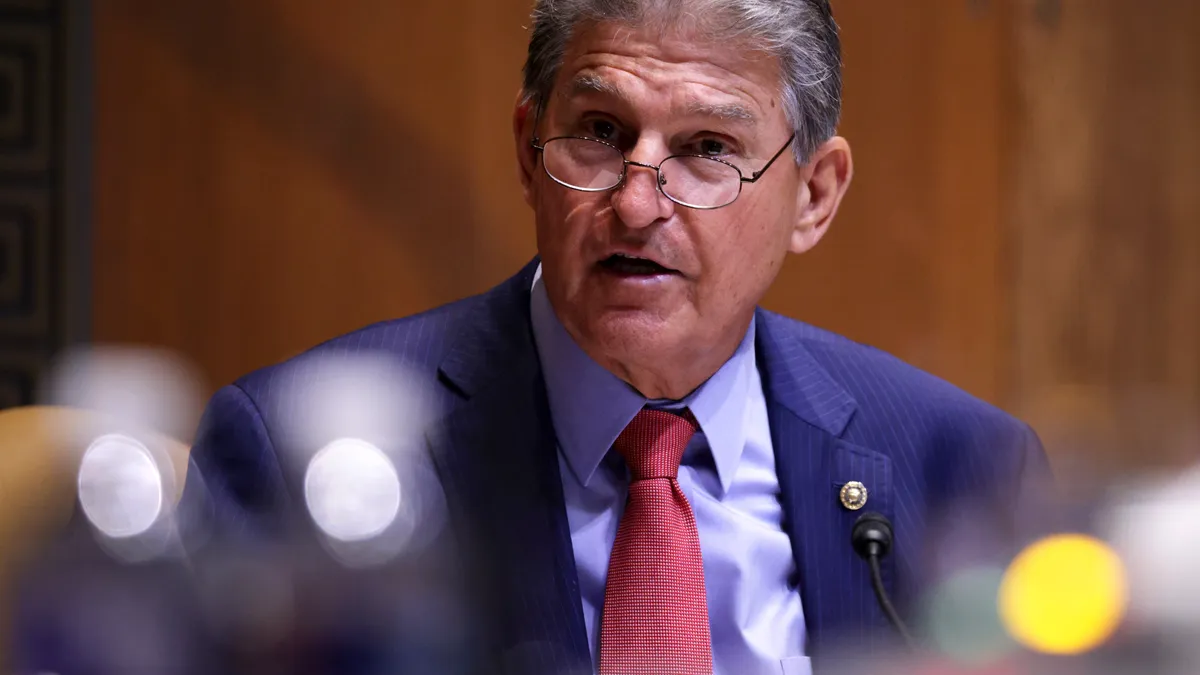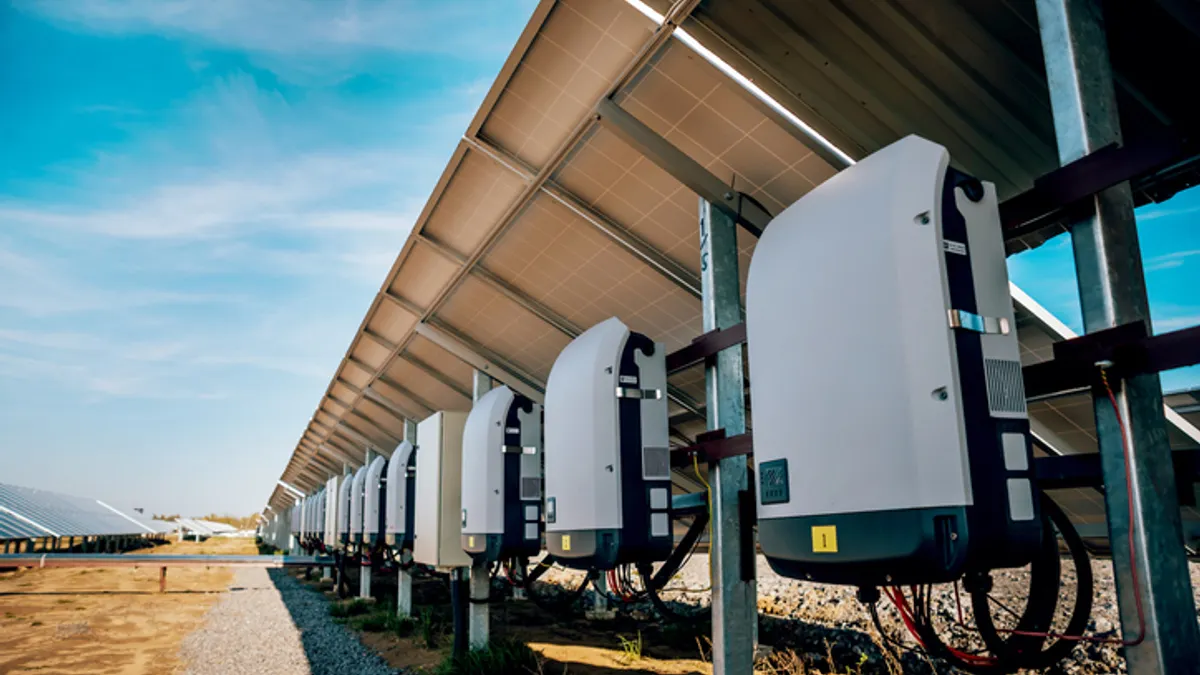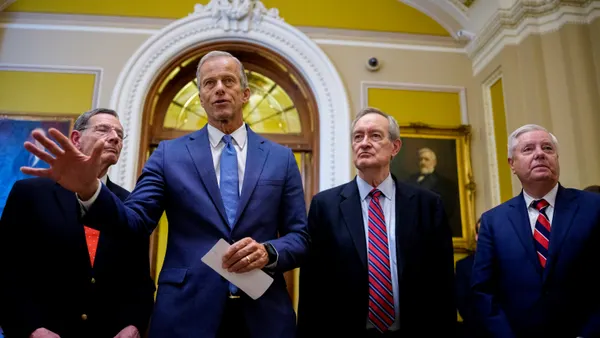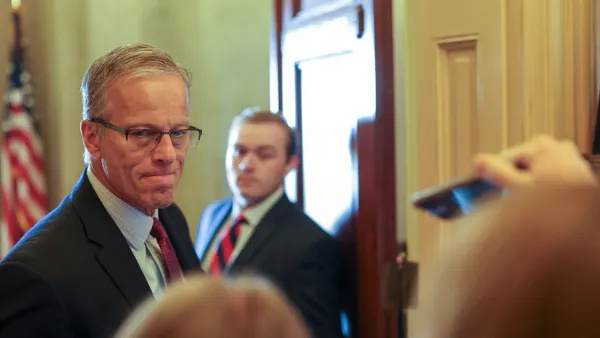Dive Brief:
- Sen. Joe Manchin, D-W.Va., on Wednesday became the first Senate Democrat to cosponsor a joint resolution of disapproval to overturn President Joe Biden’s two-year moratorium on solar panel tariffs related to imports from four Southeast Asian countries.
- The resolution now has 11 cosponsors in the Senate, with Manchin as the only Democrat to sign on so far, while the House’s version had evenly split bipartisan cosponsorship. The House voted Friday to rescind the tariffs, passing the measure by a 221-202 margin and sending it to the Senate.
- “Failing to enforce our existing trade laws undermines the goals of the Bipartisan Infrastructure Law and Inflation Reduction Act to onshore our energy supply chains, including solar,” Manchin, chairman of the Senate Committee on Energy and Natural Resources, said in a news release. “I cannot fathom why the administration and Congress would consider extending that reliance any longer and am proud to join this CRA to rescind the rule.”
Dive Insight:
On the same day Manchin announced his cosponsorship, Sen. Sherrod Brown, D-Ohio, announced he plans to vote in favor of the resolution when it reaches the Senate, saying in a release that a lack of tariffs forces manufacturers in his state to compete with “cheap, unfairly subsidized imports.”
Senator Jacky Rosen, D-Nev., in March urged her fellow Democratic senators to join her in opposing the resolution, calling it “misguided” and saying that an end to the tariff pause could be “devastating” to the solar industry.
Brown argued the opposite, saying, “The Chinese government will do anything to undermine American manufacturing, and would like nothing more than to kill the American solar manufacturing industry before it takes off.”
The two-year pause now in effect prevents any new tariffs associated with a U.S. Department of Commerce investigation into solar panel imports from Cambodia, Malaysia, Thailand and Vietnam. The Biden administration sought to give the solar industry time to import components from those countries as it builds up a domestic supply chain. Commerce’s final determination is expected August 18.
If the pause is not revoked, it will remain effective through June 2024.
Gregory Wetstone, president and CEO of the American Council on Renewable Energy, also expressed concern that the end of the pause would be “devastating” for U.S. solar deployment.
“Many new solar projects have already been delayed due to a shortage of photovoltaic panels, and this resolution only exacerbates the problem, putting tens of thousands of good-paying jobs at risk and seriously undermining the success of the IRA,” he said.
Domestic solar production has seen an uptick since the IRA increased tax incentives for solar projects and global supply became constrained as a result of the Department of Commerce’s tariff investigation and enforcement of the Uyghur Forced Labor Prevention Act that stopped many solar shipments at the border.
Though companies like U.S.-based First Solar and multinational Hanwha Q Cells have invested billions in American manufacturing and recently expanded their domestic production, many observers of the solar industry agree that even the two-year moratorium would not provide enough time for a full build-out of the domestic solar supply chain.
Steve Ottley, head of chemicals and energy at supply chain and operations consulting group SGS Maine Pointe, said in an email, “As appealing as the idea of onshoring solar panel production to the U.S. is, the fact is that currently only around 2.7% of global solar panel manufacturing is in the U.S.”
Ottley pointed out that China currently has 75% of global capacity. China surged ahead of the U.S. in solar panel manufacturing thanks in part to differences in labor and environmental regulations, and a much larger number of trained metallurgists.
“It will take years for the U.S. to scale up production,” he said. “In the meantime, creating supply chain optionality and less reliance on China is good supply chain strategy. While the senators’ proposed bill to repeal the relaxing of tariffs will appeal to the masses, it appears misguided until the U.S. production scale is achieved.”
Correction: We have updated this story to correct the deadline for Commerce's final determination for its solar panel tariff circumvention inquiry to Aug. 18.














